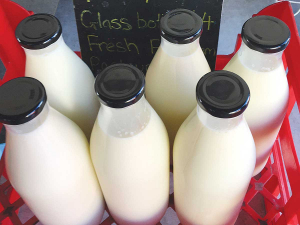Keep Your Food Safe This Festive Season: NZ Food Safety Tips
New Zealand Food Safety (NZFS) is reminding New Zealanders to keep food safety top of mind as they head into the festive season.
 Two unregistered raw milk operators have been fined for trying to circumvent the rules that regulate the sale and supply of raw milk.
Two unregistered raw milk operators have been fined for trying to circumvent the rules that regulate the sale and supply of raw milk.
Two unregistered raw milk operators have been fined for trying to circumvent the rules that regulate the sale and supply of raw milk.
Paul Ashton, of Lindsay Farm, and Daniel Sproul, of Gorge Fresh Organics also known as ‘Yaw Milk’, were sentenced in separate hearings at the Palmerston North District Court, following successful investigations and prosecutions by New Zealand Food Safety (NZFS).
Ashton was fined $27,500 and Sproull was fined a total of $20,000.
NZFS deputy director general, Vincent Arbuckle says the sentences send a strong message to people or businesses that try to circumvent rules in place to protect public safety.
“Raw milk is inherently riskier in comparison to milk that has been pasteurised to kill potentially harmful bacteria,” he says. “These pathogens can be particularly dangerous for vulnerable communities, including the young, the old, pregnant women and people with compromised immune systems.”
Arbuckle says all food producers owe it to their customers to follow food safety rules.
“This is particularly the case for people who sell raw milk. Most raw milk producers understand their responsibility. Those who do not, should understand that we will act in the interests of public health,” he says.
The sentencings are part of a wider NZFS investigation, which started in late 2019, to ensure raw milk production in New Zealand is compliant and risks are reduced.
So far, the investigation has seen nine operators charged with offences against the Animal Products Act, including knowingly causing risk to human health, failing to register, and failing to comply with legal directions to cease trading.
To minimise risk, new regulations were introduced in March 2016, under the Animal Products Act and Food Act, that mean only registered farm dairy operators can produce and process raw milk, and they must also comply with specific regulations, including strict hygiene and testing requirements.
Ashton operates Lindsay Farm in Hawke’s Bay. The court heard the company sold approximately 2,500 bottles of raw milk per week, with financial reports showing revenue of nearly $600,000 in 2019.
They offered their customers a "limited partnership" and falsely claimed the arrangement exempted them from registration because customers were buying milk from cows they owned.
NZFS contacted the company on numerous occasions, reminding them to comply with the law. Despite being issued a Notice of Direction prohibiting sale and distribution of raw milk until they registered, they continued selling raw milk.
Foodborne illness cases, including children, were linked to raw milk from Lindsay Farm, including an outbreak of Campylobacter in August 2020. It was only after this event that Lindsay Farm registered under the regulations.
Sproull’s Palmerston North-based ‘Yaw Milk’ business was also never registered to sell or deliver raw milk and instead sold it through a “dairy husbandry agreement programme”. The company illegally delivered milk to pre-arranged collection points and the investigation by NZFS also found some milk was unlabelled.
“We’re not saying people can’t drink raw drinking milk,” says Arbuckle. “What we are saying is that when people choose to have it, they’re able to make that choice with a degree of confidence that the milk they’re consuming is produced within the regulatory framework.”
He says registered suppliers, who are regularly audited, help consumers reduce the risks if they choose to drink raw milk.
"Compliance with the rules would have cost both companies $10,000 to $15,000 a year, a small amount compared to the risk of exposing their customers to unnecessary risk."
Controls on the movement of fruit and vegetables in the Auckland suburb of Mt Roskill have been lifted.
Fonterra farmer shareholders and unit holders are in line for another payment in April.
Farmers are being encouraged to take a closer look at the refrigerants running inside their on-farm systems, as international and domestic pressure continues to build on high global warming potential (GWP) 400-series refrigerants.
As expected, Fonterra has lifted its 2025-26 forecast farmgate milk price mid-point to $9.50/kgMS.
Bovonic says a return on investment study has found its automated mastitis detection technology, QuadSense, is delivering financial, labour, and animal-health benefits on New Zealand dairy farms worth an estimated $29,547 per season.
Pāmu has welcomed ten new apprentices into its 2026 intake, marking the second year of a scheme designed to equip the next generation of farmers with the skills, knowledge, and experience needed for a thriving career in agriculture.
OPINION: Staying with politics, with less than nine months to go before the general elections, there’s confusion in the Labour…
OPINION: Winston Peters' tirade against the free trade deal stitched with India may not be all political posturing by the…